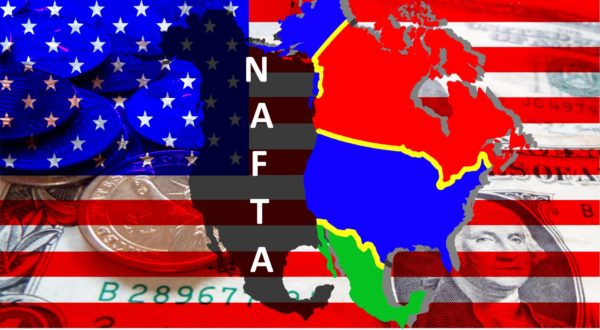While the investment markets have gotten the shakes several times this year over tariffs and a looming trade war, President Trump’s deal with Mexico this week to revise and rename NAFTA provides a glimpse into his larger trade strategy: halt China’s depredations on the rest of the world. Trump is the first U.S. president, or any president, to finally stand up to China’s international bullying.
Partnering against the bully
Writing in The American Thinker, Thomas Lifson outlines the main points of the new trade deal that the president has hammered out with Mexico’s President Pena Nieto. The deal restructures the NAFTA agreement, especially on manufacture of automobiles. Under the new agreement, 75 percent of the parts and materials content of manufactured goods would be from Mexico or America, up from 62.5 percent. Up to 45 percent of the content must be supplied by workers earning $16 per hour or more.
Trump and other critics have long held that NAFTA hands the short end of the trade stick to the U.S., and the first objective in the president’s mind was a better deal for U.S. workers. But beyond that is the closing of a door on China funneling cheap Chinese made parts through Mexico.
Trump had initially sought a three way negotiation between the U.S., Mexico and Canada. But relations have soured with Canada and the president has been vocal in his criticism of Canada’s prime minister, Justin Trudeau. It is expected that Trump, now partnered with Mexico, can and will exert more pressure on Canada to foster a better trade deal with the U.S.
It may be that Trump’s hardball strategy even with America’s strongest partners in the world, in North America and Europe, is designed to force them from their timid complacency against China’s bullying. China’s theft of intellectual property is quite literally official government policy. It manipulates currency and imposes punitive trade restrictions. Beyond the trade arena, the Chinese navy is throwing its weight around in the waters around the Asian continent, daring anyone to oppose it. China has become the world’s schoolyard bully.
Trump has shown that he is willing to oppose China in its industrial espionage, unfair trade policies and currency manipulation. The problem has been to get the nervous nellies in other nations to join in. As powerful as the U.S. is, it cannot do this alone. If China can arm twist America’s trading partners to undercut U.S. efforts, nothing will change. Thus Trump turns the heat up on U.S. trading partners, essentially telling them to “man up”.
Could tariffs puncture the stock market and economy?
China has more to lose from an ongoing trade war with the U.S. but the Asia cultural tradition of not “losing face” and being humiliated by loss, will cause China to continue to ratchet up tariffs against the U.S. If the U.S. and China continue to trade tit-for-tat tariff blows, it could take its toll on U.S. investment markets and the economy. Traditionally, in negotiations with Asian nations or businesses, the way to break the spiraling hostility is for the Western negotiators to offer a way for the Asian counterparts to “save face”, to offer a compromise from which both can benefit. At some point China will have to make concessions on its unsavory practices at which point the President can offer them a deal that secures those concessions and rewards China for finally acting in good…or at least better, faith.
The question is: will the tariff war continue to the point that it damages the world investment markets and economy? Tariffs don’t cause inflation, but they boost inflation. True inflation is inherently a result of bad monetary policy. But economic factors can exacerbate it.
We believe that there are three economic factors that can contribute to the current uptick in inflation. One is the labor shortage as the economy has caught fire and is growing. As the labor shortage deepens, wages will rise, contributing to price inflation.
The deepening shortage of oil supplies will push fuel prices higher, contributing to higher prices. And trade tariffs could be the third factor, until Trump eases back, which we believe he will at some point.
Preparing for a potential market decline
The economy is doing well, but this bull market in stocks is very long in the tooth. As the Federal Reserve continues to raise interest rates and the aforementioned oil prices, labor shortages and tariffs raise prices, risks increase that the investment markets will turn over and enter bear territory. Do not let your portfolio take a major hit as many people did in 2008 and in 2000.
Contact our office for a complimentary portfolio review.
Check our website to sign up for the next Smart Money Investor Training Workshop.
Be sure to listen to the latest edition of Jerry Tuma’s Smart Money Radio.

